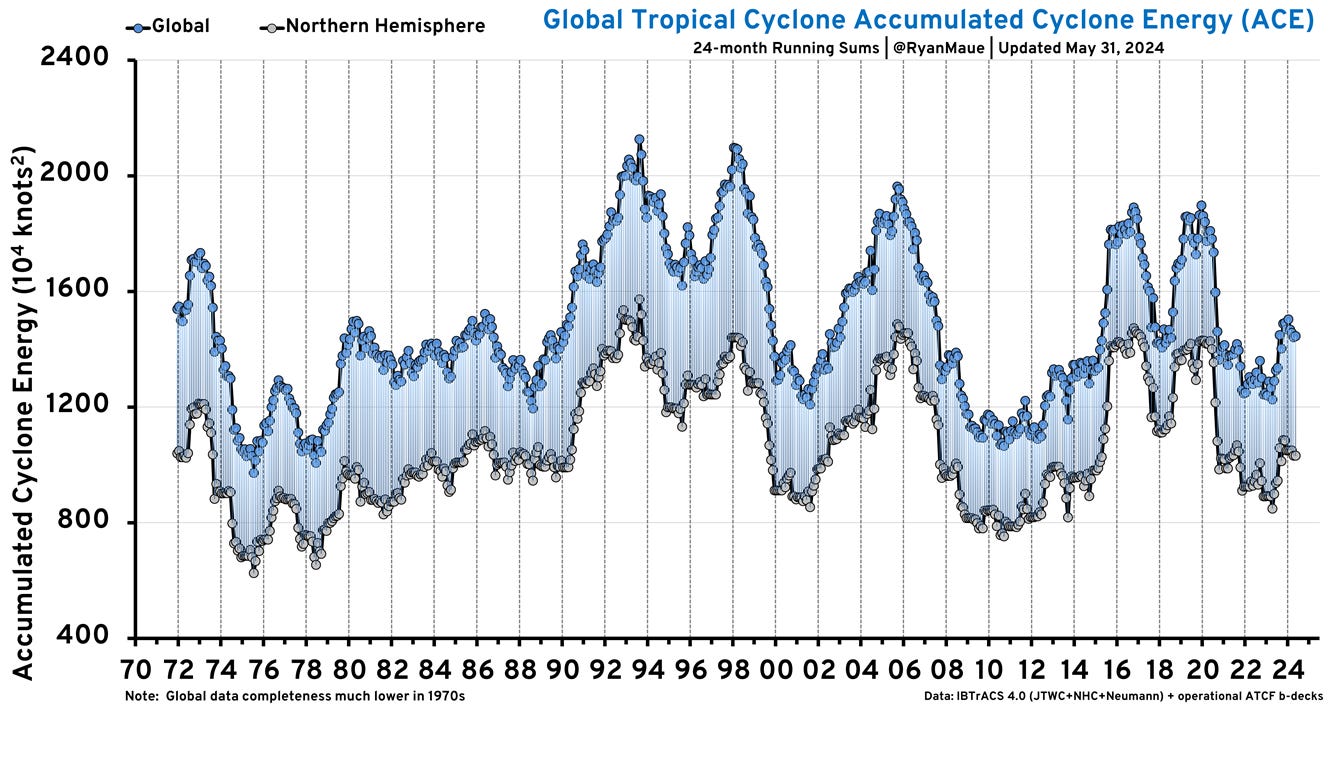Climate Change Is Real, But Most Things You Hear or Read About It Are Not
Two things can be true:
- Climate change is real, and is affected by our release of CO2 and other greenhouse gasses
- The press, politicians, and sadly the scientific community are exaggerating the threat and almost daily butchering what is climate change and what is not.
Human activity is adding carbon dioxide to the atmosphere at a significant rate that is way faster than normal cycles. CO2 is a serious long lived greenhouse gas. The effects of greenhouse gasses are real, and our solar system offers a convenient demonstration. Mercury’s daytime temperature is around 800℉ with no atmosphere. Despite receiving only 1/3 the solar energy of Mercury, Venus with thick air including CO2 is hotter at around 850℉. Therefore we are by definition affecting the climate by adding CO2. As Kevin Bacon said so wonderfully in A Few Good Men, “These are the facts of the case and they are not in dispute.” (+100 points for referencing the “You Can’t Handle the Truth” movie in a column about truths 😉)

However… almost everything else should be in dispute to some degree, including temperature data (and related effects like the rate at which sea levels are rising), and certainly “where we are going from here”. Dispute, challenge, and debate are supposed to be the heart of politics, journalism and science, but they have been short circuited on this issue.
Climate change is a huge topic, and touches on subjects as broad as how science should function, and how or even whether energy sources such as fossil fuels, solar, and nuclear should be used. I will cover each of those in later columns because they have their own intriguing and contrasting truths. For now, let me give a general rebuttal to the climate alarmist narrative, one so prevalent today that surveys show large numbers of young people suffer anxiety because of it. I also am trying to keep this short and not overly technical, so here is my simplified but hopefully fair case.
The first clue that climate change has become “political” or a “cause” is the blatant way that it is blamed for almost any “big” weather event.
- Heat waves happening as I write over the 4th of July long weekend – labeled “climate change” and “unprecedented” while cooler parts of the country are ignored
- Hurricanes Harvey and Irma hit back to back in 2017, and it was a global warming apocalypse in the press. The inconvenient fact – it had been over 10 years since a major storm hit the US.
- Hurricane Idalia was the only major US land-falling hurricane last year, a Category 3. Almost every press story mentioned climate change
- Maui fire – climate change
- California fires – climate change
- Droughts – climate change
- Winter storms – climate change
Now, let’s put the spin aside. Below is the graph of the total amount of energy in hurricanes for the past 50 years.

Given that graph, do you think any rational person could assign a recent hurricane to global warming? Oh but wait you say – there is science behind that! Let us consult the UN’s IPCC (Intergovernmental Panel on Climate Change), the effective “bible” in this area and what all the scientists and governments plan around.
The IPCC says, truthfully, that climate is a statistical description of weather and related variables. Climate change is the change in those statistics over time. And even the most doom filled predictions only show a modest increase in these “bad” statistical changes. Thus the IPCC does not say to attribute individual events to climate change. So what is going on?
I think it’s laziness, and also narrative fitting. The press and politicians (I used to be one – I saw it first hand) don’t want to tell you everything that is going on. The press wants to tell you things that generate fear and clicks so they can sell ads. Politicians want you to think that you need saving, many times want to avoid blame or responsibility for complex issues, or want just to keep power. Thus both institutions cherry pick things to talk about. That’s how you get years of low hurricane activity ignored and then every one after that blamed on climate change. The political right who just dismiss it out of hand as a “hoax” are also chosing what evidence to view.
I grew up in the South and suffered through all kinds of heat waves. Now suddenly it’s all global warming. The press gets you scared and wanting to click, the politicians get you on the hook for their “solutions”. The reality is, that only honest scientists running detailed math can tell you whether there is an increase in the number of events. Thus the bottom line – if you see a weather event blamed on climate change that is false. It is unknowable. This drove Alabama’s most respected long time meteorologist James Spann so crazy he posted a great rebuttal on Medium, where he said “Weather does exist. Extreme weather has always, and will always happen.
But to me the larger tragedy in all of this is that the scientific community is not much better than the press and politicians. If you depart from orthodoxy you are cast out. Dr. Judith Curry was the chair of the School of Earth and Atmospheric Sciences at Georgia Tech. She believes in human caused climate change, but in her expert opinion based on a myriad of evidence, she did not think it was as bad as the majority believed. For saying so she ended up having to resign, citing the “poisonous” climate around doing science on the climate. Dr. John Christy at the University of Alabama – Huntsville is a former NASA panelist and an expert on temperature data taken from satellites, which show much less warming than ground stations. Thus sadly he is also subject to shunning and cancellation efforts, and even maybe violence.
These scientists and many others push back against the “doom” narrative, which comes from computer models. There is a perverse kind of competition in computer models – those that give the most “worrying” results get the most attention. Remember the computer model out of University College London very early in COVID that predicted apocalyptic fatalities? It was wrong, but because it was so scary, it drove worldwide policy.
These models are very intricate and have lots of variables. CO2 is only one. A well discussed unknown is cloud cover – the models cannot predict well how cloud cover reacts to more CO2 and warming. There is some reason to believe that more rain / warming means more clouds which reflect sunlight. How does it all work and net out? We don’t know for sure. But we have models. In fact the IPCC itself is a thousands of pages report on what these models say. And the report itself is not much of a doom predictor. Instead, the attached “summary for policymakers”, which is very political, again cherry picks the worst case to show doom.
The tendency to exaggerate and predict catastrophe reminds me of many lobbyists at the capitol during my time there. To get representatives to vote their way, they would not tell you a balanced and nuanced (and thus true) version of the issue. Instead they induced panic / fear in legislators that if they didn’t vote the right way all kinds of bad things would follow. Again, human nature.
But what if the worst case models and oracles are right? Then are we doomed? Short answer – no.
Google searching seems to show that the most recent worst case predictions from 2024 forward are yearly rises of 0.1℉ of temperature and 0.4 inch of sea level. These are much higher than consensus actuals over the past 100 years (closer to 0.01℉ and 0.1 inch). But even if you stipulate these worst case predictions are true (and note the previous 25 years of worst case predictions have not come true), that’s just not that fast. All these effects happen very slowly – giving people all kinds of time to build, move, react, plan, reconfigure…. and prevent any alleged “civilizational collapse”. So the “save the Earth” stuff is just silly. Humans with no technology survived outrageous climate change during the Ice Age. Today’s changes might (and I mean might) end up as highly disruptive, but it’s not an “existential threat” by any reasonable account.
There are so many failed doom climate predictions it’s impossible to list them all, but one guy tries here. I’ll just mention one. Al Gore in his “documentary” said polar ice caps would be gone by 2013. Still here.
One last point – everything is a tradeoff. COVID showed the very tricky landscape of tunnel vision on just solving one problem and not considering massive collateral damage on everything else. Ethanol from corn is a big anti-climate change “reduce greenhouse gas” initiative. There was a lot of press several years back that the massive production of ethanol increased corn prices and decreased food corn, which may have exacerbated famines in Africa. Let us speculate that ethanol price effects made famine/starvation a mere 0.1% worse the past 10 years, during which millions died of hunger. Did this happen? Maybe. But if so, that’s still thousands of extra deaths. Sadly the world is not in an honest discussion place on climate change to make tradeoffs. It is hysteria or nothing.
So let’s wrap up this very cursory examination. I believe it is true that climate change is happening, and humans are contributing to a portion of that change with activities like burning of fossil fuels. Addressing that is something serious, and is worthy of policy, public attention, and resources. I also believe that it is true that the issue has been strongly exaggerated due to a variety of human weaknesses, including wanting to promote a narrative, feeling smart, gaining political power, and earning grant money and publication slots.
Skepticism and balance used to be a hallmark and proud virtue of science and journalism. Somehow this issue has broken it.
Please subscribe to my “2 Things True” columns here
